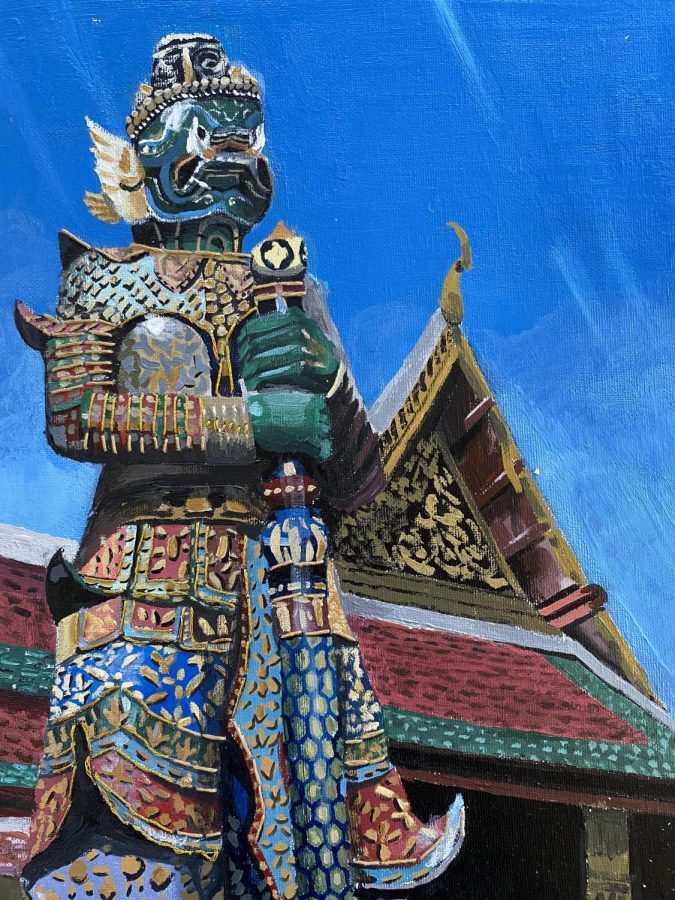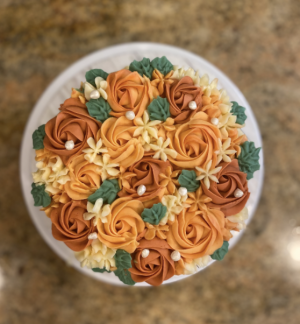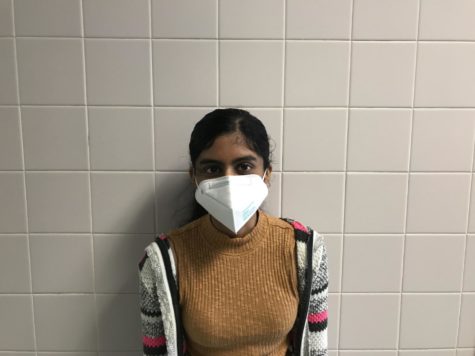Artists should create for themselves, not others
Junior Caitlyn Kantaparn’s “Grand Presence” carries cultural significance. Art allows people to express complicated emotions and discover themselves on a deeply personal level.
April 23, 2021
From a young age, artists may feel the need to continuously make progress during their free time, turning their hobby into hustle. While the hustle mindset can increase productivity, it can also take the joy away from their passions.
Art is personal and carries a sense of creative freedom. For those with creative hobbies, their works have cultural significance and evoke special memories in a way that can’t be replaced.
“My favorite piece is titled ‘Grand Presence,’ and it’s created using acrylic paint and embroidery on a canvas,” junior Caitlyn Kantaparn said. “Not only did I enjoy the process, but the bold colors and stance give me a sense of pride for my culture. I would be open to selling prints or digital copies of my work. However, I wouldn’t want to monetize my physical artworks because I feel too connected to them to give them away.”
Discovering the work of others in the art community can encourage artists to learn something new and pursue their own art style. Though it can be easy to fall into the trap of feeling inferior to more experienced artists, art should be ultimately focused on personal fulfillment. Creating art is proven to not only reduce stress, but also lead to a sense of pride in one’s creations. Artists should take their time and discover themselves through their hobbies.
“Art has been a part of my life for as long as I can remember, and I find it exciting how I can transform a plain canvas and art materials into something comprehensive and new,” senior Aleena Alvi said. “As a growing artist, I take a lot of inspiration from other artists around me. Whether it be a minor blending technique or the way the edges of a line are accentuated, I find myself adding small pieces of what I find interesting to create my own, unique style.”
However, there are times when motivation inevitably runs dry. Many artists are familiar with “art block,” a period of time during which it can be difficult to find inspiration or create new works. Experiencing this lack of progress may make artists feel guilty for slacking off rather than enjoying their hobbies as they usually would.
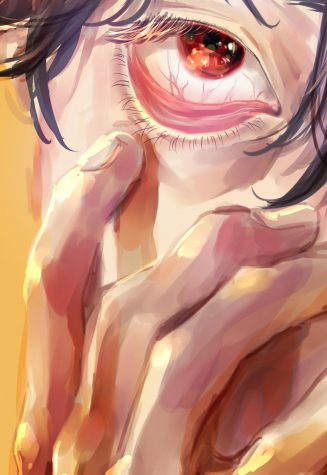
“Sometimes I just can’t think of anything to draw, and I spend hours trying to find a good reference photo,” freshman Keerthi Paladugu said. “Additionally, during the process of making the art, I overthink it and begin wondering if it’ll actually turn out the way I want it to, which then brings down my hopes for the artwork.”
Artists may feel pressured to constantly see improvement in their work and feel unsatisfied as a result. However, it is important to remember that taking breaks is just as important to grow as an artist.
“If you enjoy making art, then don’t let others’ work discourage you,” Alvi said. “Even the artists whose art seems worlds above your own needed to put in years of practice and time in order to get where they are right now.”
For those whose artwork takes precedence in their lives, making a living is of utmost importance. Since art requires a lot of time and effort to complete, many artists turn to selling their works or taking commissions, which can help fulfill personal goals and improve satisfaction in their art since their hard work paid off.
“Making money from commissions is a great way for artists to support themselves and create better and new artwork,” Alvi said. “I actually have monetized my work currently and in the past through commissions and merchandise sites such as Redbubble. Commissions would not only better support underappreciated artists, but help give more merit to their work.”
While the extra money is useful, commissions aren’t for everyone. For casual artists, commissions can take up a lot of time from schedules and add to the ever-increasing stress that comes with meeting deadlines. If an artist overworks themselves just to make ends meet or fulfill societal expectations, it can potentially take a severe toll on their mental wellbeing and satisfaction with their art.
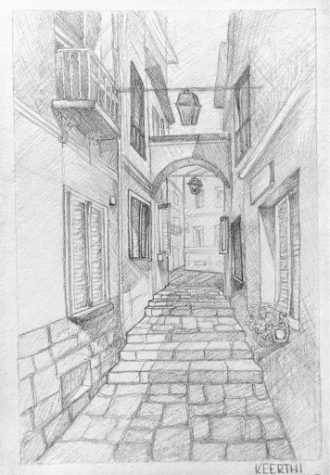
“For me, it can be challenging to find time to think of concepts and complete pieces, especially when there are deadlines,” Kantaparn said.
Modern capitalism traps artists into constantly being productive and making money wherever possible in their spare time, with the idea that working in a hobby wouldn’t feel like working at all. However, in reality, there is nothing wrong with pursuing a hobby simply for pleasure and not to meet other people’s standards.
“Create an Instagram account, keep sketchbooks and do whatever will get your art out there without worrying about how good it is,” Alvi said. “You don’t have to focus on making your product photo-realistic. Instead, experiment and develop your own art style.”
Artists shouldn’t have to feel pressured into being perfect or meeting anyone else’s standards. First and foremost, they should do something they love because they love it. There isn’t any need to monetize their joy unless it’s a step they are willing to take.
“I would say to not be too focused on making things perfect or impressing other people, and instead create art to learn or express yourself,” Kantaparn said.


